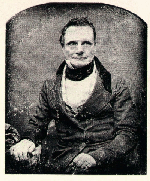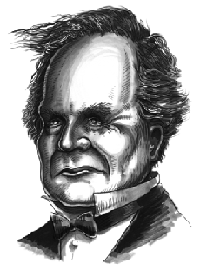The Digital Research Initiative
The University of North Carolina at Chapel Hill
Charles Babbage

Charles Babbage
Born in Devonshire, UK on December 26, 1791, Charles Babbage played a
crucial role in the scientific and technical development of the period.
As the inventor of the first universal digital computer, Babbage is
known to many as the "Father of Computing." The use of Jacquard punch cards,
of chains and subassemblies, and ultimately the logical structure of the
modern computer all come from Babbage.
Babbage's greatest achievements were his detailed plans for "Calculating
Engines," both the table-making Difference Engines and the more elaborate
Analytical Engines, which were powerful punch-card controlled
general purpose calculators. The Analytical Engine possessed features
similar to those of the modern stored program computer. These features
included punched-card control; separate store and mill; a set of
internal registers (the table axes); fast multiplier/divider; range of
peripherals; and array processing.
 Babbage produced a few prototypes of
the Difference Engine.
However, he lost government support and failed to build a fully functional
engine from his plans. Babbage made several important contributions in
other areas: he wrote a consumer guide to life assurance; pioneered
lighthouse signaling; scattered technical ideas and inventions in
magnificent profusion;
developed mathematical code breaking; and made important contributions to
the field of political economics. Despite these achievements, the
failure to construct his calculating machines, and in particular the
failure of the government to support his work, left Babbage in his
declining years a disappointed and embittered man. Babbage produced a few prototypes of
the Difference Engine.
However, he lost government support and failed to build a fully functional
engine from his plans. Babbage made several important contributions in
other areas: he wrote a consumer guide to life assurance; pioneered
lighthouse signaling; scattered technical ideas and inventions in
magnificent profusion;
developed mathematical code breaking; and made important contributions to
the field of political economics. Despite these achievements, the
failure to construct his calculating machines, and in particular the
failure of the government to support his work, left Babbage in his
declining years a disappointed and embittered man.
Babbage was Lucasian Professor of Mathematics at Cambridge. He is
responsible for founding both The British Association's Statistical
Society and the Royal Astronomical Society. Babbage's Difference
Engine was to be capable of calculating human intellect by motive power.
 Babbage was from the newtonian school
of thought and believed that
once all things where explained, all things could be predicted.
The Marquis Laplace, an avid Newtonian and friend of Babbage,
said that if a mind could know everything about particle behavior,
it could describe everything: "Nothing would be uncertain,
and the future, as the past, could be present to our eyes". Babbage was from the newtonian school
of thought and believed that
once all things where explained, all things could be predicted.
The Marquis Laplace, an avid Newtonian and friend of Babbage,
said that if a mind could know everything about particle behavior,
it could describe everything: "Nothing would be uncertain,
and the future, as the past, could be present to our eyes".
Babbage was essentially addicted to mathematics and
wanted to explain everything with the use of figures, charts, or any
other mathematical expression. He would stop to check the heart beat
of animals; he wanted to quantify everything and anything.
Babbage was not familiar with concepts of heat propagation,
nor was he knowledgeable on the efforts made by colleagues on heat and
mechanical energy. This lack of knowledge was perhaps his greatest
obstacle to building the engine, according to some. It is easy to forget
that Babbage was essentially a child of the Enlightenment, and that his
epoch was much different from our own. He resided in an era of wood and
coal, and the later era of steel and oil would not begin for perhaps a
decade after his death.
The Analytical Engine
 In Babbage's design for the Analytical Engine, the discrete functions of mill (in
which "all operations are performed") and store (in
which all numbers are originally placed, and, once computed, are returned) rely
on this supposition of reversibility. That means
information cannot be shuttled between mill and store without leaking, like
faulty sacks of flour. Babbage did not consider this,
and it was perhaps his greatest obstacle to building the engine.
In Babbage's design for the Analytical Engine, the discrete functions of mill (in
which "all operations are performed") and store (in
which all numbers are originally placed, and, once computed, are returned) rely
on this supposition of reversibility. That means
information cannot be shuttled between mill and store without leaking, like
faulty sacks of flour. Babbage did not consider this,
and it was perhaps his greatest obstacle to building the engine.

The information on this page is from other web pages has been reproduced only for academic discussion, evaluation, research
and complies with the copyright law of the United States as defined and stipulated
under Title 17 U. S. Code.
This site made by

|

|
This site was created especially for students of the UNC School of Journalism's
JOMC 050 Class, and anyone else who may be interested.
For more information, please contactdaikat@email.unc.edu
|
|



